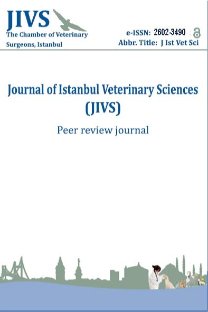Clostridial infections and malign edema in farm animals
Clostridial infections usually occur in herbivores, especially in ruminants, as well as in carnivores and
humans. There are many subtypes of the bacteria. Although they usually cause enteritis in ruminants, they
give rise to fatal infections in the brain, kidneys and muscle tissue. Among Clostridium species,
Clostridium (Cl.) perfringens are classified according to four major antigenic lethal exotoxins. The major
toxin of Cl. perfringens type A is the alpha toxin. Cl. perfingens A causes gas gangrene with other
clostridial agents. In type A infections, acute intravascular hemolysis is rarely seen in calves and lambs.
Animals are often found dead or in coma. Jaundice and hemoglobinuria are seen in clinical findings. Cl.
perfringens type B is the causative agent of lamb dysentery. Mesenteric torsion and hemorrhagic enteritis
are the most typical findings found in necropsy. Cl. perfringens type C leads to enterotoxaemia known as
“struck” in adult sheep. In necropsy, a large amount of clear, pale, yellow, coagulated fluid and
subperitoneal bleeding are found in the abdominal cavity. Cl. perfringens with type D toxin (epsilon)
causes enterotoxaemia in sheep and goats. Epsilon toxin is secreted from the intestines, but it acts on the
brain and kidneys. It causes pulpy kidney and focal symmetric encephalomalacia in the brain. Cl. difficile
A toxin causes acute hemorrhagic and necrotic enteritis in horses and humans. Enterotoxemia is usually
seen in lambs that are in good body condition and grazing on pasture in spring. The disease occurs as a
result of reduced intestinal peristalsis and the release of excessively fed animals with grains or
concentrated forage into the pasture. Reduced intestinal peristalsis leads to hypo-mobility, which prevents
the transportation of the bacteria to the colon and results in the multiplication of the bacteria in the
intestine. Excessive grain or concentrated forage intake leads to high accumulation of the starch in the
intestine. High levels of starch provide a favorable environment for the multiplication of saccharolytic
bacteria and toxin production. Clostridial infection in muscles take the most important second place,
following the clostridial infections in gastrointestinal system. Here, the most important agent is
Clostridium chauvoei, which is the agent of the disease “blackleg”. Cl. septicum, Cl. perfringes, Cl. novyi,
Cl. sordelli and Cl. chauvoei cause emphysematous gangrene and malign edema alone or with clostridial
bacteria. Malign edema includes some cases of the clostridial myositis, in which emphysematous
gangrene does not occur. In animals, gangrenous myositis is more common than non-gangrenous myositis.
Malign edema is actually typical cellulitis rather than myositis and has a high mortality rate (death in 48
h), but even in toxigenic infection, muscle damage may not be significant. The reasons of the occurrence
of infection are traumas, intra-muscular injections (vaccines), injuries to female genitalia during
parturition, castration, shearing and the sectioning of tail. In rams, the wounds occur on the top of the head
during fighting (big head- swelled head). Among these infections, malign edema causes difficulties being
recognized by the veterinarians working in the field because of the special findings of the disease.
Therefore, it is aimed to present and compare the general features of the cases with clostridial infections
and malign edema.
